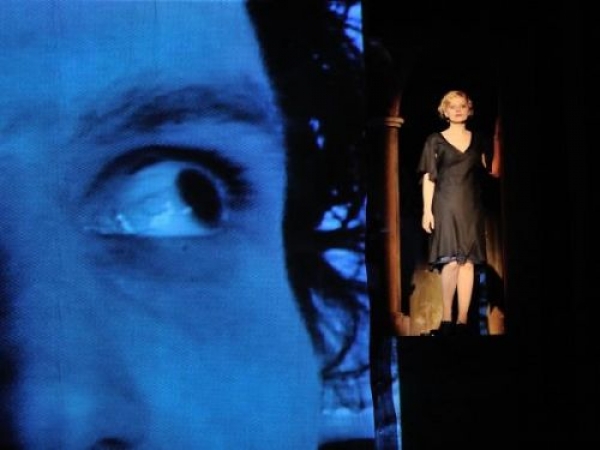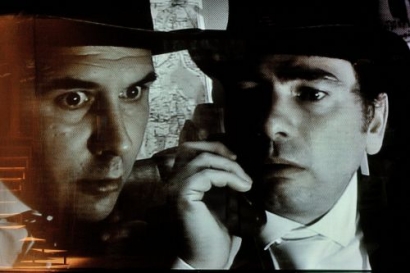Master and Margarita

Co-production of Maladype Theatre (Budapest) and Radu Stanca National Theatre (Sibiu)
Original theatrical version: Ilona Kiss, Zoltán Balázs
Translator: Crista Bilciu
Director: Zoltán Balázs
![]()
The performance directed by Zoltán Balázs "speaks many languages", namely polyglot, like Woland himself. Regarding the congenialities and differencies of the two cultures, the director searches the common set of different theatrical thinkings and aspects with the help of Romanian-, Hungarian-, English-, Russian-, and French-speaking actors in two performances with different concepts. In one version Ákos Orosz, actor of Maladype Theatre, in the other Mariana Mihu, great actress of Radu Stanca National Theatre plays Woland. In both versions the brilliant Ofelia Popii plays Margarita.
In the first phase of the rehearsals the actors of different nationalities didn't work with the play itself, just concentrated on speaking the same theatrical language and creating a "common vocabulary", In the next phase the participants met the visible and invisible dimensions of the Bulgakovian world in unique film-music-theatre composition due to the special dramaturgy of the adaptation which presents the performers`metamorphosis on different horizons.
The special adaptation places the well-known and less known Bulgakovian texts among new coordinates (Hungarian text by Ilona Kiss and Zoltán Balázs). Bulgakov's multilevel text and the complex persons of the diverse stories come to life between the walls of a ruined Polish Armenian church rebuilt as set (set by Zoltán Balázs and Velica Panduru) with unexpacted flashing videoprojections, phenomenal music (Zeno Apostolache) and choreography (by Zoltán Balázs). In both versions widely illustrious guests appear at Satan`s Ball: directors who radically changed the theatrical thinking of the last century.
Bulgakov's novel appeared in book form earlier both in Romania and Hungary than in the Soviet Union and it became a cult novel in these countries. Today the author`s classic is a real "theatrical" novel: inevitable experience and challenge both for actor and director, for a company and the audience. Catalina Buzoianu was among the first to stage her own adaptation with huge success in 1980 inTeatrul Mic (Bucharest). The set and costume designer of this actual performance and many other directions of Zoltán Balázs is Velica Panduru, daughter of Catalina Buzoianu.
The monumental Romanian-Hungarian coproduction which has a unique scenery will be a special event of the Sibiu International Theatre Festival celebrating its 20 year anniversary. Maladype is already a "frequenter" at the Festival, the company's debut was in 2011 with Leonce and Lena, then they performed Egg(s)Hell with huge success in 2012. Zoltán Balázs got a closer look at the company of Radu Stanca National Theatre during the Festival's workshop in May 2012. Due to this encounter 21 outstandin Romanian actor make the team of Master and Margarita.![]()
Players:
Mariana Mihu, Orosz Ákos, Ofelia Popii, Marius Turdeanu, Adrian Neacşu, Cristina Ragos, Diana Fufezean, Serenela Mureşan, Lendváczky Zoltán, Eduard Pătraşcu, Tankó Erika, Ema Veţean, Pali Vecsei, Adrian Matioc, Cătălin Pătru, Florin Coşuleţ, Vlad Robaş, Dan Glasu, Mihai Coman, Viorel Raţă, Arina Ioana Trif, Ciprian Scurtea, Gabriela Neagu, Éva Ungvári
Creators:
Literary adviser: Zoltán Balázs
Set and Lighting designer: Velica Panduru and Zoltán Balázs
Costume designer: Velica Panduru
Choreographer: Zoltán Balázs
Music: Zeno Apostolache
Opening Night: 22, 23 March 2013, Radu Stanca National Theatre, Sibiu, Romania
Tour:
CAFe Budapest Contemporary Arts Festival, Budapest - 2013
SIBFEST International Theatre Festival, Sibiu, Romania - 2013
Awards:
Master and Margarita was nominated for UNITER’s awards: Best Performance, Best Director (Zoltán Balázs), Best Scenic Design (Velica Panduru, Zoltán Balázs), Best Actress in a Leading Role (Mariana Mihu) and Best Actor in a Leading Role (Marius Turdeanu).

